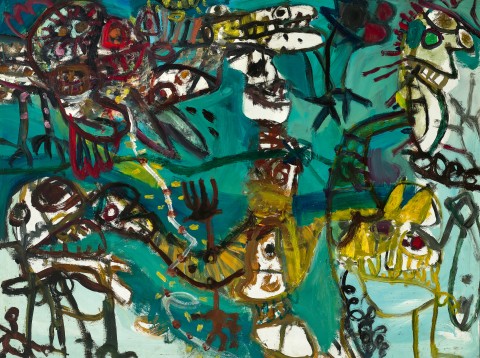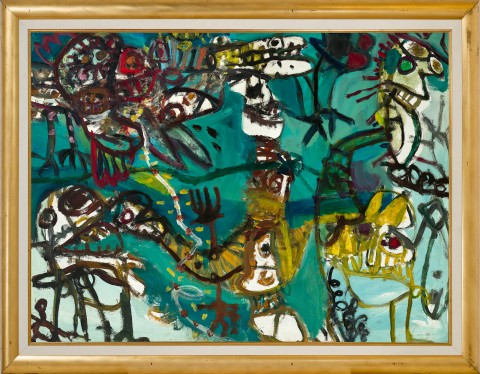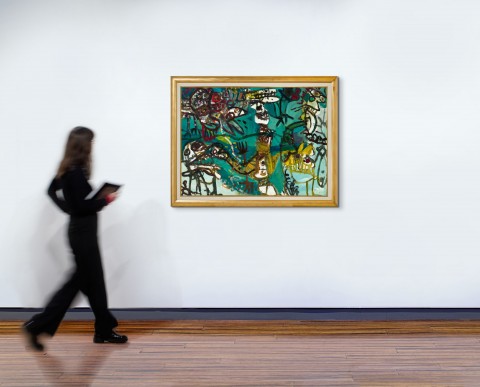JOURNEY THROUGH THE SEA PORT, 1961
JOHN OLSEN
oil on composition board
97.0 x 127.0 cm
bears inscription lower right: John Olsen 61
signed and inscribed verso: John Olsen 482 Glenmore Rd, Edgecliff / SYDNEY. AUSTRALIA
Thelma Clune, Sydney
Christie's, Melbourne, 6 March 1970, lot 69 (as ‘Landscape with Animals’)
Private collection
Christie's, Sydney, 26 October 1987, lot 718 (as ‘The Sea’)
Gallery 460, New South Wales
Sotheby's, Sydney, 29 November 1993, lot 85 (as ‘Journey Through the Seaport’)
Henry Krongold, Melbourne
The Estate of Paul Krongold, Melbourne
Great Australian Artists of the Twentieth Century, Lake Macquarie Gallery, New South Wales, 22 July – 16 August 1992
We are grateful to Kylie Norton, Editor, John Olsen Catalogue Raisonné, for her assistance with this catalogue entry.
‘…I brushed a line around the core theme, the seed-burst, the life-burst, the sea-harbour, the source of life… I wanted to show the Harbour as a movement, a sea suck, and the sound of the water as though I am part of the sea... I am in the sea-harbour and the sea-harbour is in me.’1
With his distinctive meandering line, exuberant mark-marking and mastery of colour, John Olsen is universally revered as one of the most important artists in a generation that defined the way Australia perceived its natural environment. Throughout his vast career spanning more than seven decades, he revealed an unerring fascination with the natural world in all its myriad forms, creating evocative depictions of the landscape that arguably capture the spirit and character of this country more eloquently than any other non-indigenous artist before him. Significantly, despite his extensive travels throughout the Australian interior and further abroad in England, Spain and Portugal, it was the beauty of the Sydney Harbour and its surrounds that remained his most enduring source – inviting endless physical and intellectual wonderment both at the colour and play of light on the water, and the various life forms inhabiting the sea and its edges.
No doubt borne from an idyllic childhood spent living on the shores near Bondi, Olsen’s love of the harbour was reignited in the early 1960s when, having recently returned from abroad, he moved with his young family into a small fisherman’s cottage in the picturesque Watsons Bay at the tip of the South Head. Drawing inspiration anew from the colour, dynamism and vitality of the harbour, Sydney’s crown jewel, thus Olsen embarked upon his ‘littoral’ series of works which, featuring the chaotic flux of tides, city and people, are resplendent in their vivacious palette and energy. Witness for example, Entrance to the seaport of desire, 1964 or the celebrated Five Bells, 1963 (both in the collection of the Art Gallery of New South Wales) – the latter inspired by the tragic 1939 poem of the same name by Kenneth Slessor that would also provide the impetus for the artist’s monumental mural commission for the northern foyer of the Sydney Opera House, Salute to Five Bells, 1972 – 73.
An important prelude to these masterpieces, Journey Through the Sea Port, 1961 not only attests to Olsen’s ‘lifelong love affair with Sydney Harbour’2, but reflects the artist’s increasingly fluid approach to the boundaries between abstraction and figuration in the wake of the infamous Antipodean Manifesto polemic that had divided Sydney and Melbourne art worlds in 1959. Notably, where his grid-like seaport paintings of the mid-1950s had demonstrated a predominantly figurative emphasis, in the early sixties Olsen now expressed his affection for the harbour in a much more organic and empathetic way3, with the undulating tides that connect the city and its inhabitants tangibly captured in both the fantastic abstract forms and the sensuous physicality of the paint surface itself. Betraying the artist’s keen interest in the interchangeable, metamorphic imagery of Pacific and Melanesian art at the time, thus disparate hybrid images of human, animal and vegetal forms here merge and flow into one another, all organically uniting within the seascape – everything happening at once in joyful homage to the circus of living. Raw colour applied straight from the tube, together with pulsating calligraphic brushstrokes set against a ground of sonorous blues further enhance this celebratory spirit, creating a bold, dynamic composition that resonates with a Vitalist energy.
Seducing the eye through its transmutable forms, sinuous line and colour and hedonistic exuberance, indeed Journey Through the Sea Port, exemplifies well Olsen’s art of the early sixties when his star was in brilliant ascendency, and he was embarking upon what would become some of the most iconic images of his career.
1. The artist, referring to his celebrated Five Bells, 1963 in the collection of the Art Gallery of New South Wales, see: https://www.artgallery.nsw.gov.au/collection/artists/olsen-john/
2. Bungey, D., John Olsen: An Artist’s Life, Harper Collins, Sydney, 2014, p. 110
3. Hart, D., John Olsen, Craftsman House, Sydney, 2nd edition, 1991, p. 62
VERONICA ANGELATOS


